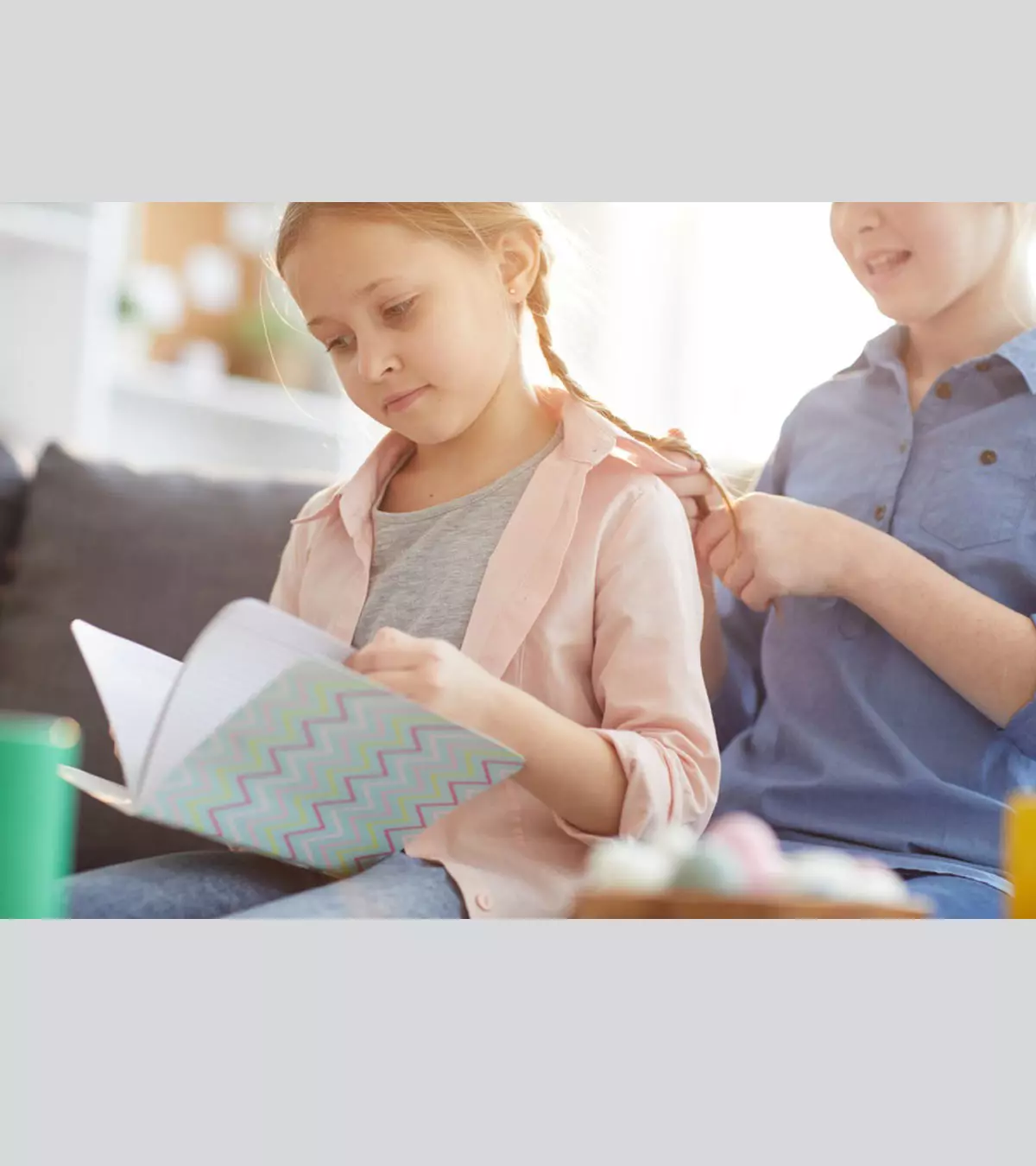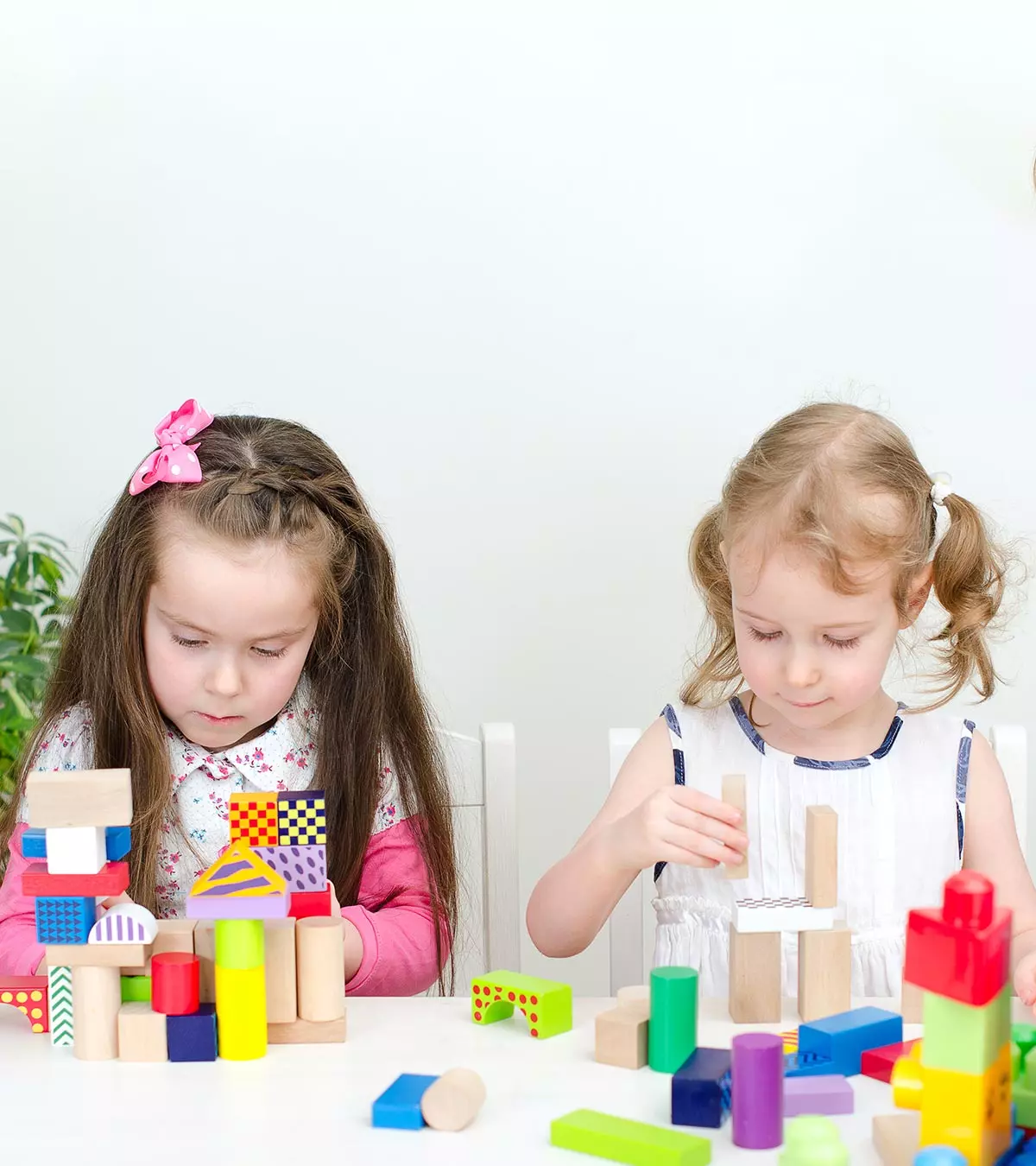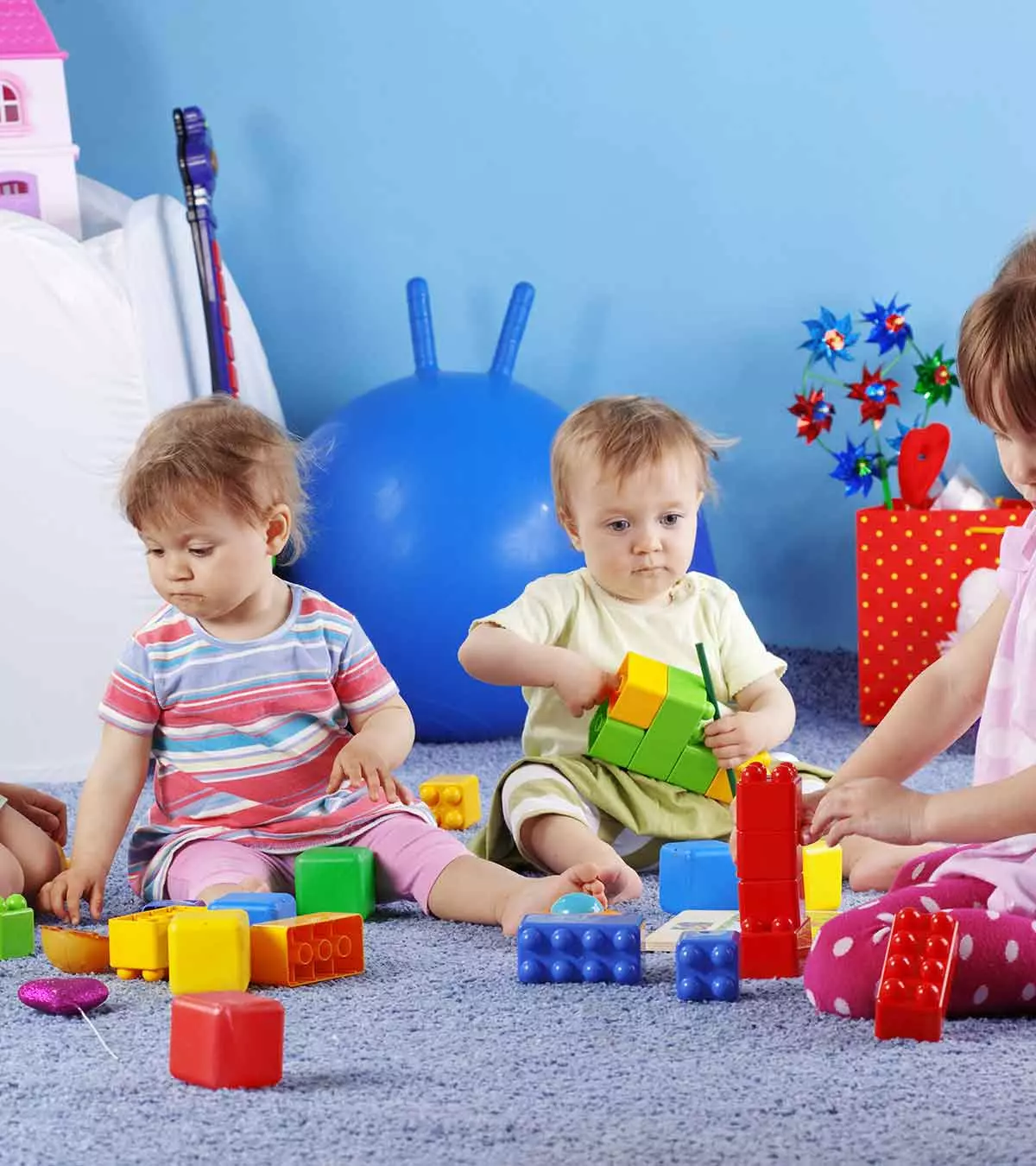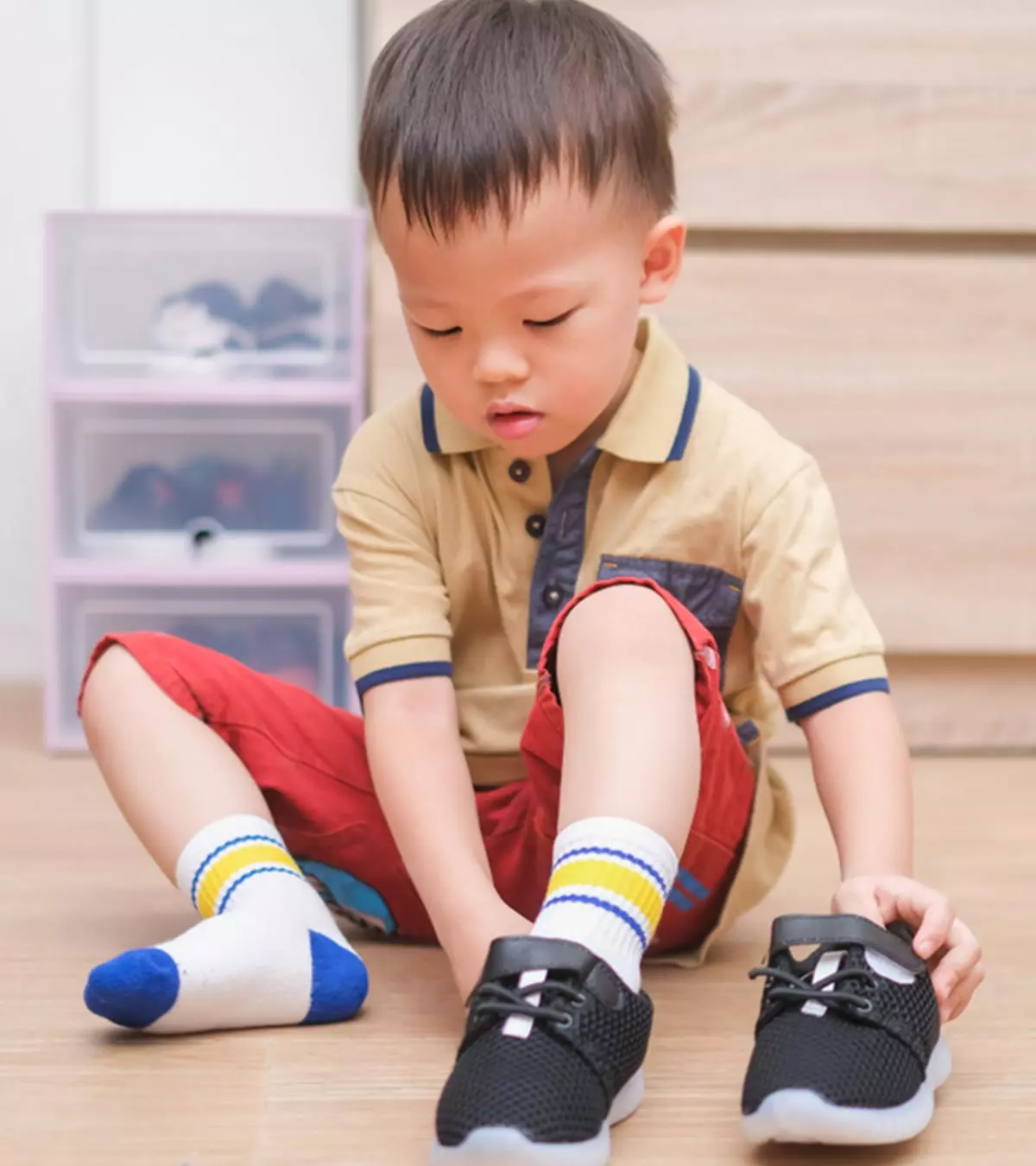
Image: Shutterstock
As a parent, you must instill certain basic life skills for kids, including social, interpersonal, coordination, problem-solving, and creative skills. Children who are well-acquainted with these skills may find it easier to make decisions, meet day-to-day challenges, and handle situations better in the absence of elders.

Life skills are to be taught to children from an early age. Parents must make sure that their children learn and practice these skills to grow into successful adults in the future.
Browse through this post to learn about the essential life skills for your child and learn the importance of teaching these skills to your children.
Key Pointers
- Building life skills is a life-long process that should begin in childhood.
- Inculcating life skills in children helps them analyze options, make logical decisions, and understand the impact of their decision on others.
- Time management, critical thinking, coping with failure, and resilience are a few life skills that children should learn to be self-aware, confident, and responsible.
- Assigning age-specific tasks to children from a young age can help teach life skills to them.
What Are Life Skills?
The World Health Organization defines life skills as “a group of psychosocial competenciesiAbilities related to an individual’s psychological and social skills that aid them in dealing with various life challenges. and interpersonal skillsiA set of abilities that enable one to interact with people effectively and build relationships. that help people make informed decisions, solve problems, think critically and creatively, communicate effectively, build healthy relationships, empathize with others, and cope with and manage their lives in a healthy and productive manner (1).” The 10 core life skills identified by WHO include, “Self-awareness, empathy, crritical thinking, creative thinking, decision-making, problem-solving, interpersonal skills, effective communication, coping with stress, and managing Emotions (2).”
 Point to consider
Point to considerEmpowering your children to hone their life skills will help them make logical decisions and learn what to do in different situations and how to do them.
Importance Of Life Skills For Kids
Developing life skills is a lifelong process and helps individuals grow, become mature, and achieve success. Building essential life skills is an exercise that helps children develop proper judgment and good habits. Life skills for kids also help them develop personalities, talents, and mental and physical abilities (2). In everyday life, possessing life skills helps children
- Find different ways of solving problems.
- Build self-confidence and self-esteem.
- Analyze options.
- Develop a greater sense of self-awareness.
- Appreciate others and build empathy.
- Make better decisions.
- Recognize the impact of their actions.
- Become responsible.
- Improve self-regulation.
- Prevent negative and high-risk behaviors.
- Improve emotional intelligence.
- Learn collaboration with others.
- Improve social skills.
Essential Life Skills For Kids To Learn
Here is a list of essential life skills parents should help their children acquire. These life skills will help kids be independent and prepare them for real-life challenges by instilling values like resilience, empathy, team player, and other traits.
1. Cultivating independence
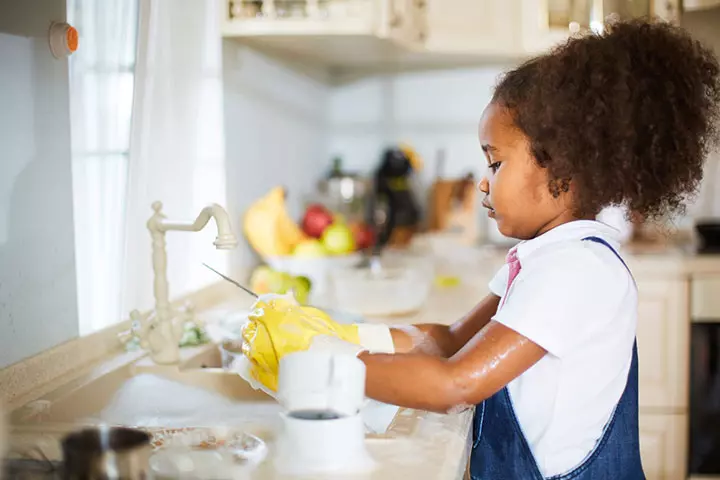
To let children build independence, allow them to understand a few things on their own and give them opportunities to do tasks and activities without assistance. This helps build self-confidence and self-esteem and encourages them to do simple tasks without help and be self-reliant. Remember, self-awareness for kids is essential to recognize their strengths and weaknesses and develop empathy for others (3).
Carrie, father of Henry and blogger, says, ”I am now helping Henry to use a swing independently so he doesn’t need to rely on me pushing him, and by doing this it did make him start to learn this skill, and it made him use other things in the park like climbing frames rather than him playing on the swings all the time (i).”
2. Decision-making
Making appropriate decisions is among the essential life skills for kids to learn and practice from a tender age. For example, allow your child to choose between different types of clothes, toys, food, and games. Encouraging your child to understand the outcomes of their choices can improve their self-management abilities. Letting your kids decide for themselves on small matters from a young age can help them to become better and more thoughtful as they navigate through challenges and opportunities in their later life (3). Guide your child through this process to help them weigh the pros and cons before making any decision. Also, allow them to make mistakes when making decisions and learn through practice.
3. Self-defense
Self-defense skills will help the child gain self-confidence and inner strength and serve them well in their lives. Self-defense is not just about protecting oneself from physical force. Instead, it includes being proactive to prevent problems and using assertiveness to respond to bullying. It also teaches children how to identify dangerous situations, assess them, and then handle them. A study published in the Child and Adolescent Psychiatry and Mental Health Journal also states that practicing martial arts (a self-defense technique) can help to strengthen mental health outcomes in children by boosting self-esteem, self-confidence, concentration, and self-discipline in their lives (4).
4. Understanding another person’s perspective
When your child explains some difficult situation that they or their friends encountered, encourage the child to look at the scenario from another person’s perspective. Teach your child the emotional reactions people give out in various situations. This can improve their problem-solving skills and ability to understand people around them. It can also help them to develop connections and maintain relationships (5).
5. Talking to strangers
As your little child grows, they will meet different people, including teachers, classmates, bus drivers, and shopkeepers. Develop social skills in your child. Teach them how to talk to strangers and explain themselves. It will help improve their communication skills and make them more sociable. There are various games focusing on communication skills for kids that you can try to help your child hone their conversation abilities. Explain to your child that not all strangers are bad, and they need to be able to communicate with people from various backgrounds, all the while knowing that they need to maintain a safe distance and not be too friendly with everyone. The National Crime Prevention Council emphasizes teaching children the warning signs of suspicious behavior of a stranger. For instance, if the stranger adult asks to disobey or do something without telling their parents, to keep something secret, or makes them feel uncomfortable, they may not be safe (6).
6. Time management

Time management is a skill that helps children in every activity they do. It teaches them to differentiate between important work and urgent work and prioritize their tasks and duties. Using a timer, planning a checklist, and avoiding over-scheduling are some tips on time management for kids that can help them stay organized. Additionally, you can encourage children to make a daily schedule with specific time slots for different activities and tasks for managing their time better and simultaneously learn the crucial aspect of self-discipline (7).
7. Coping with failure
Failure is a part of life, and it helps every individual learn life lessons. Remember that you won’t be there to soothe your child every single time they feel left out or falls short at a task.
 Experts say
Experts sayMake your child understand that failure is a part of the learning process and teach them to embrace their failures. Explain to them that failure doesn’t define a person and that it is how people cope with failures and come out stronger from that that counts. As parents, you must also make sure not to burden your kids with unexpected responsibilities or pressures or make comparisons. Ensure a nurturing environment at home to allow kids to share their concerns freely.
8. Critical thinking
Critical thinking is one of the essential skills that every child should learn. Critical thinking helps one analyze and absorb information, compare situations, look at things from different angles, and make inferences.
To develop critical thinking in your children, provide them with opportunities to play games that involve critical thinking, allow your child to solve their problems, teach them to reflect on their responses, ask open-ended questions, and encourage them to think in new and different ways (7).
9. Facing challenges
A child can grow up to be a strong adult when they learn how to take on challenges with a positive attitude. Therefore, encourage your child to try new and different things. You could let them start by learning how to ride a bike or climb a tree. Let your child choose their challenges, face failure, bounce back from failure, and keep trying. Taking up challenges helps build confidence and a never-give-up attitude in them.
10. Resilience
Resilience is an important skill you should teach your child. This can be developed by not feeding your child with solutions constantly but by allowing them to understand a problem, think about what they can do, and solve it independently. Make sure that your child has enough flexibility to adapt to different kinds of changes and environments. Make sure that your child is flexible enough to adapt to different kinds of changes and environments. A few strategies you could adopt to help build resilience in your children may include having them solve puzzles or do their homework independently, practicing challenging skills like archery, and allowing them to handle some age-appropriate household chores to promote independence. Additionally, your support can further help them to overcome challenges and move forward with resilience. As David Anderson, PhD, a clinical psychologist at the Child Mind Institute, says, “Life will throw all kinds of challenges at kids, And the goal of support is to build up resilience and develop coping strategies (8).”
11. Budgeting and managing money

Being money-savvy is a vital skill every individual should possess. Teach your child about money-management, how to spend responsibly, and to invest for their future at an early age. It will help them equip themselves with skills to manage their finances responsibly, and prepare them to make thoughtful decisions over finances (7).
You could give your child a certain amount of pocket money once in fifteen days or once a month. If your child wishes to buy something expensive, ask them to save money and buy it. This practice will ensure they plan their budget, save before spending, and not indulge in impulsive buying.
12. Good health and hygiene
It is vital to teach your child the importance of health and personal hygiene from a very young age. It will not only help instill healthy habits in children throughout their lives but can also protect them from several infections and diseases (9). Teach them the importance of brushing their teeth twice a day, washing their hands, taking a bath, and eating healthy.
Also, discuss the different types of food based on your child’s interests. For instance, if your child likes taking care of their hair, talk about foods that contain proteins and potassium. If your child loves physical activity and sports, talk about foods that increase stability and stamina.
13. Treating a wound
It is not possible for you to be around your child every time. Empower your child to take care of themselves in case of any emergency. To ensure that your child does not get anxious looking at a wound, avoid overreacting yourself. Let the child know where the first-aid kit is and how to treat wounds and cuts.
Teach your child to press the area with a clean cloth, hold the cut under the tap water, wash it with a mild soap, apply ointment with a cotton swab, and cover the wound with a bandage, gauze, or tape. However, it is also vital to teach children to look for an adult or contact emergency service providers for help (10).
14. Cooking meals
Ask your child to help you make meals. You may assign them a few tasks, such as cutting vegetables and fruits, applying jam or butter onto a piece of bread, or putting the chopped vegetables into a bowl to make a salad.
Preparing simple meals and helping you in the kitchen will help them understand healthy food habits and teach them to be self-independent (10).
Ruby Rankin, a single mother of three girls, shares her experience of cooking meals with her daughter. She says, “Cooking with my girls has always been more than just preparing meals — it’s a vital part of our family life. And as a single mother, I’ve found that the kitchen is a particularly unique and important space where we can bond, learn, and grow together — a place that brings us closer, teaching us about teamwork, creativity, and health in ways that are oftentimes both fun and deeply meaningful.” Adding further the benefits of cooking meals with her daughters, she adds, “Through cooking, I’ve seen my daughters become more adventurous with their food choices and more willing to try new things. When my middle daughter, who used to be a picky eater, for example, decided to make a stir-fry with a variety of vegetables she’d previously avoided, she was so proud of her creation, and to her surprise, ended up loving it (ii).”
15. Doing laundry

Teaching your children how to do laundry will reduce your burden and instill responsible habits in them while also promoting independence in children. Young children can help in pairing socks and putting dirty clothes into the laundry basket, while older children can be taught how to use washing machines, measure the right amount of detergent, hang laundry for drying, and fold their clothes.
16. Gift wrapping
Wrapping a gift will help develop the child’s creative thinking skills and help them learn different techniques of wrapping. You could give them paper and tape and ask them to wrap gifts for their friends or grandparents on special occasions. Gift wrapping is also a great way to improve your child’s motor skillsiSet of abilities that help move and control various body parts, especially hands, legs, and fingers. and hand-eye coordinationiAn important cognitive skill of performing movements with hands while being guided by the eyes. (11).
17. Gardening
Gardening is an interesting life skill that helps children with their physical development, while also developing sensory skills in young children (12). Allow your child to help you in the garden and learn about different flowers, fruits, and vegetables. Encourage young children to water the plants regularly, while the elder kids can get involved in weeding, painting the fence panels, and mowing under supervision. You could also introduce children to some fun and creative gardening activities for kids or DIY garden ideas to stay engaged.
18. Looking after pets
Having pets at home will help your child build empathy and learn how to be caring and responsible. It can also provide companionship and reduce stress in children as well as adults (13). Your child can help you clean the cages, prepare food, take the pets out for a walk, and prepare the bed for them.
19. Digital literacy
Children of this generation spend a considerable amount of time on their screens. So it is essential to reinforce a few rules to help them safely navigate the digital world. According to UNICEF, “digital literacy refers to the knowledge, skills, and attitudes that allow children to be both safe and empowered in an increasingly digital world (14).” Therefore, you should first allow your child to use the internet wisely and for its benefit. Secondly, teach them how to use the Internet safely and responsibly.
20. Cleaning and doing chores

Getting children involved in cleaning activities is challenging. Start by asking them to keep their room clean, make their bed, and arrange their table. You could also ask them to help you set the dining table for a meal or clean the dishes after eating. Learning how to do chores helps children understand their responsibilities, help them to develop organizational skills, and become independent (15).
21. Getting ready
It is essential to allow your child to get ready themselves. Let them pick their outfit for the day and wear it on their own. Teach them how to brush their teeth, take a bath, and comb their hair before school. These are basic skills every child should learn from a very young age.
22. Table manners
Teach your child the basic table manners, such as using a knife and fork while eating, washing the hands before meals, and eating with their mouths closed. You could also teach your child how to behave at a restaurant and how to order food. These table manners help children to learn to show respect, build confidence and self-esteem, and also foster cultural awareness in them (16).
23. Swimming
Swimming is one of the essential life skills for children. The American Academy of Pediatrics recommends teaching swimming to children as young as one year of age to prevent any drowning accidents (17). It also benefits children in several other ways, both physically and mentally, and helps them build confidence. Swimming is also an excellent way to teach children about water safety and improve their endurance.
24. Using maps
Guide your child with the routes around the city and help them remember the different routes via landmarks. You could also ask your child to direct you to your home every time you go out to ensure that they remember the route. Teach them how to read a map and use a GPS. If your child has lost their way home by any chance, knowing how to reach map signs and being familiar with the landmarks and routes can help them return.
25. Traveling
It is important that your child knows the basics of traveling. Starting from taking public transport to cycling, make sure that your child is well-versed in how to get from one place to the other. For example, teach them how to buy a bus ticket or metro ticket and explain which metro or bus leads to your house. This life skill will instil independence and confidence in children from a young age.
26. Environmental awareness
It is important to raise and nurture a generation that is environmentally aware and knows the importance of sustainable living (18). It will also help them to become responsible human beings and promote healthy habits in children. For instance, you can teach the three R’s- Reduce, Reuse, Recycle, by setting up a recycling station or segregating waste at home. Also, teach them to conserve energy and water with some simple instructions, like turning off the fans and appliances when not using and not wasting water.
Life Skills Checklist For Kids
Do you want your child to be prepared to face the real world and grow into independent adults? Help them with these age-specific abilities.
| For Ages 2 and 3 | For Ages 8 to 12 |
|---|---|
| |
| For Ages 4 to 7 |
|
Frequently Asked Questions
1. How can schools incorporate life skills education into their curriculum?
Schools can integrate life skills education into their curriculum by providing classes that teach practical skills like financial management, time management, communication, and decision-making. Schools can also encourage them to participate in volunteering and internships to develop interpersonal and workplace abilities.
2. How can parents motivate their children to learn life skills?
Parents can motivate their children to learn life skills by being a good role model, giving them a supportive and encouraging environment, and making them take part in activities that require life skills in their daily lives.
3. How can life skills training help in building children’s confidence and self-esteem?
The knowledge and experience of practical skills acquired from life skills training can help build children’s confidence and self-esteem. Such training provides them with opportunities to solve problems, make decisions, and deal with real-life situations on their own; thus, making them feel more competent and capable.
4. What are some basic financial management skills that children should learn?
Budgeting, saving, making a balance sheet, and carefully handling their spending are a few of the basic financial management skills that children should acquire. It’s important for children to have knowledge of financial goal-setting and the fundamentals of investing.
5. How can children learn problem-solving skills?
Children can learn problem-solving skills through practical examples, such as playing puzzle games, reading inspirational books, and applying the learned skills in real-life situations. You can also teach problem-solving to kids by providing them with opportunities to solve problems, make decisions, and overcome challenges independently.
Life skills for kids play an intense role in their overall growth and development. These help them succeed in various ventures of life in the right way. Life skills allow children to realize their true potential and improve their self-esteem by making them feel more independent. Learning and adapting them can also enhance their decision-making ability to live harmonically with others in society. Therefore, you must consider teaching these life skills at an earlier age, in ways that they would find fun and entertaining. Lastly, remember that teaching life skills to your child requires effort, patience, time, and consistent work.
Infographic: Life Skills You Must Teach Your Children
While your child may learn and discover many things on their own as they grow, it is advisable to teach some essential life skills that will benefit them always. This infographic lists a few additional crucial life skills parents should teach their children.
Some thing wrong with infographic shortcode. please verify shortcode syntax
Illustration: Essential Life Skills For Kids To Learn
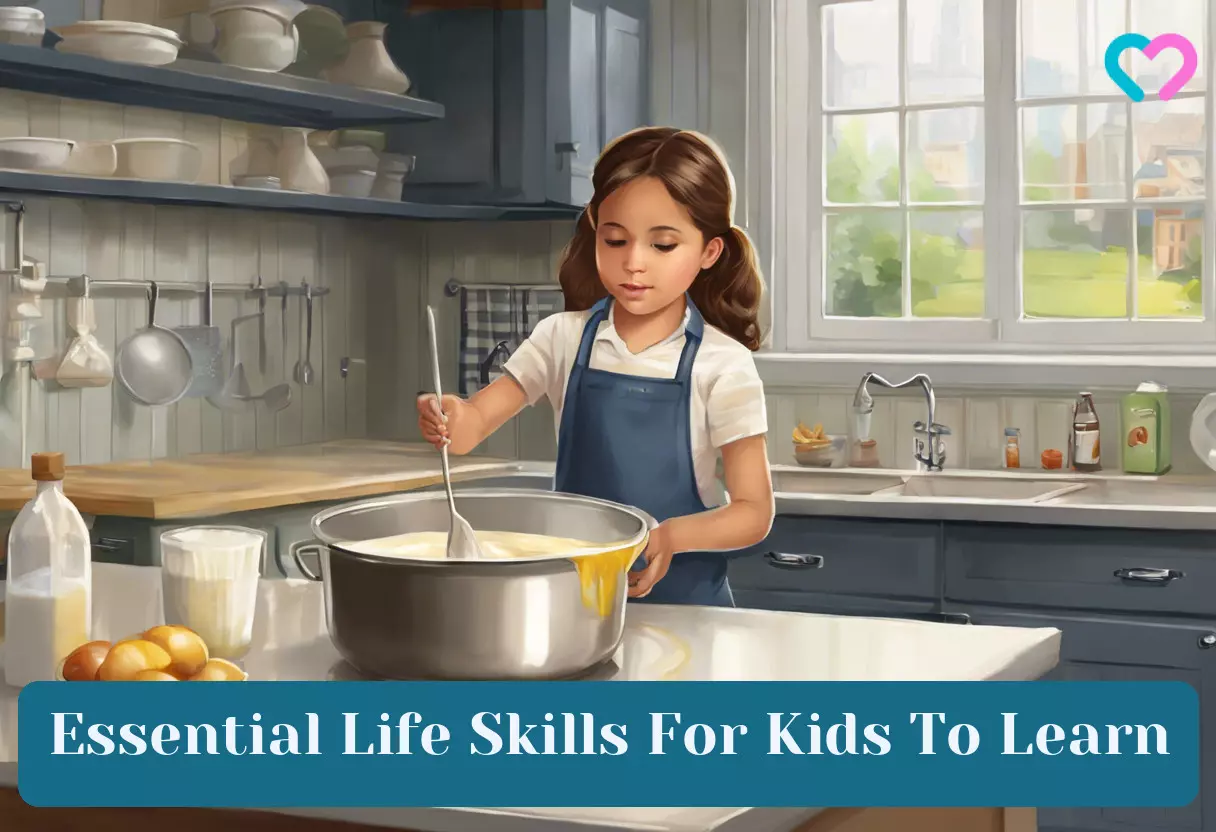
Image: Stable Diffusion/MomJunction Design Team
Children need to learn some essential life skills to become functional adults. Watch this video to learn about the top 7 skills your child must learn.
Personal Experience: Source
MomJunction articles include first-hand experiences to provide you with better insights through real-life narratives. Here are the sources of personal accounts referenced in this article.
i. Getting your kids to be more independent;https://theparentingadventurestipsandtricks.wordpress.com/2025/07/28/getting-your-kids-to-be-more-independent/ ii. Why I Cook With My Children;
https://medium.com/@ruby.rankin1/why-i-cook-with-my-children-d977fbd1270b
References
- Knowledge Brief; Basic Life Skills Curriculum.
https://www.unicef.org/azerbaijan/media/1541/file/basic%20life%20skills.pdf - Curriculum and Guidelines for Life Skills (Jeevan Kaushal) 2.0; University Grants Commission.
https://www.ugc.gov.in/pdfnews/4371304_LifeSkill_JeevanKaushal_2023.pdf - What are Self-awareness Skills for Students?
https://articles.unishanoi.org/what-are-self-awareness-skills-for-students/ - Joseph M Strayhorn and Jillian C Strayhorn; (2009); Martial arts as a mental health intervention for children? Evidence from the ECLS-K; NCBI
https://pmc.ncbi.nlm.nih.gov/articles/PMC2766365/ - Tokiko Taylor and Timothy L Edwards; (2025); What Can We Learn by Treating Perspective Taking as Problem Solving?; NCBI
https://pmc.ncbi.nlm.nih.gov/articles/PMC8476683/ - What to Teach Kids About Strangers?
http://archive.ncpc.org/topics/violent-crime-and-personal-safety/strangers.html - 13 Essential Life Skills for Child to Achieve Future Success.
https://articles.unishanoi.org/life-skills-for-kids/ - Supporting vs Enabling.
https://childmind.org/article/supporting-vs-enabling-a-child-with-challenges/ - Hygiene.
https://www.unicef.org/wash/hygiene - Life Skills for Kids: Tips For Raising Competent, Confident Children.
https://lemonadeday.org/blog/life-skills-for-kids - Learning Activities.
https://www.before5.org/toolkit/learning-activities/131-wrap-it-up - Gardening with young children helps their development.
https://www.canr.msu.edu/news/gardening_with_young_children_helps_their_development - How children can benefit from having a pet.
https://www.animalhumanesociety.org/resource/how-children-can-benefit-having-pet - Digital literacy for children: 10 things you need to know.
https://www.unicef.org/innocenti/documents/digital-literacy-children-10-things-you-need-know - Chores and Children.
https://www.aacap.org/AACAP/Families_and_Youth/Facts_for_Families/FFF-Guide/Chores_and_Children-125.aspx - Teaching Your Children Good Table Manners: A Recipe for Success.
https://www.podareducation.org/blog-teaching-your-children-good-table-manners-a-recipe-for-success - Swim Lessons: When to Start & What Parents Should Know.
https://www.healthychildren.org/English/safety-prevention/at-play/Pages/Swim-Lessons.aspx - 9 Tips to Cultivate Sustainability and Environmental Awareness for Students
https://sph.edu/blogs/environmental-awareness-for-students/ - How to Help Kids Cope With Disappointment; Katie Hurley.
https://www.pbs.org/parents/thrive/how-to-help-kids-cope-with-disappointment
Community Experiences
Join the conversation and become a part of our nurturing community! Share your stories, experiences, and insights to connect with fellow parents.
Read full bio of Dr. Sadhvi Mythili
Read full bio of Bharathi V
Read full bio of Harshita Makvana
Read full bio of Apoorva K






